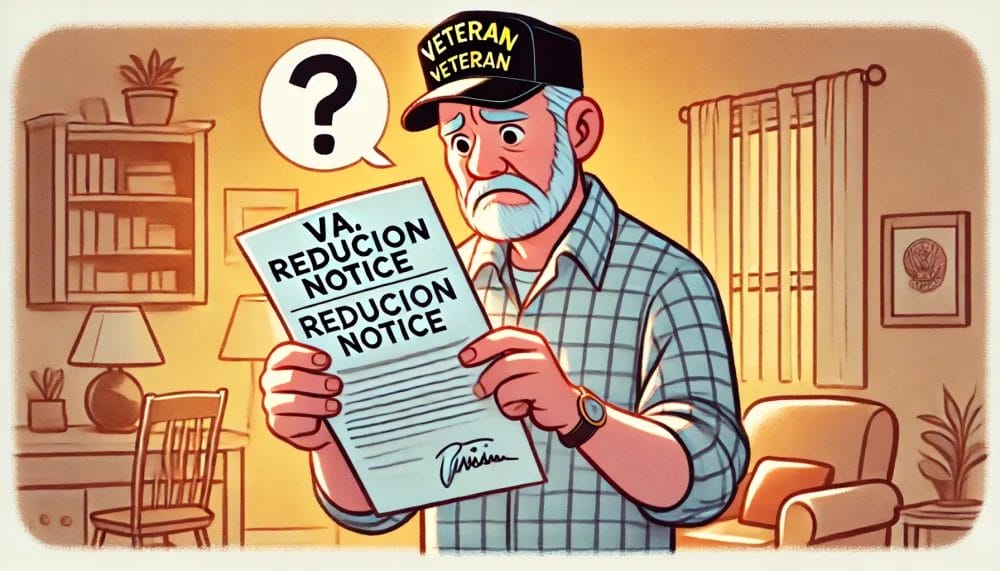As a veteran receiving disability compensation, it’s natural to wonder, “Can the VA decrease my disability rating?”
Understanding how the Department of Veterans Affairs (VA) evaluates and adjusts disability ratings is crucial for safeguarding your benefits. This comprehensive guide will explore the circumstances under which the VA can reduce your disability rating, how often this happens, and what you can do to protect your compensation.
Understanding VA Disability Ratings
VA disability ratings are percentages assigned to service-connected conditions, reflecting the severity of the disability and its impact on your ability to work and perform daily activities. These ratings determine the amount of monthly compensation you receive. For more details on how the VA assigns ratings, visit the VA’s official page on disability ratings.
Need Some More Help with your VA Disability?
Learn more about the VA Disability process and get help with our VA Disability Chatbot programmed and trained by AI

Can the VA Reduce Your Disability Rating?
Yes, the VA can reduce your disability rating under certain circumstances. If evidence shows that your condition has improved, the VA may propose a reduction in your rating, which could lead to decreased monthly compensation.
Conditions for Reduction
- Medical Improvement: If medical examinations or records indicate that your condition has significantly improved since the last evaluation.
- Scheduled Re-Examinations: The VA may schedule periodic re-examinations to assess the current state of your disability.
- Failure to Attend VA Examinations: Missing a scheduled VA examination without good cause can result in a reduction or termination of benefits.
How Often Does the VA Reduce Compensation?
The frequency of VA disability rating reductions varies. While the VA has the authority to re-evaluate and reduce ratings, it doesn’t necessarily do so regularly or arbitrarily. According to Hill & Ponton, reductions typically occur when there’s clear evidence of improvement.
Protections Against Reduction
- Five-Year Rule: If your rating has been in place for five years or more, the VA must show sustained improvement in your condition to justify a reduction.
- Ten-Year Rule: After ten years, the VA cannot terminate service connection unless evidence proves fraud.
- 20-Year Rule: Ratings in place for 20 years or more are protected from reduction below the lowest rating held during that period.
- Age Considerations: Veterans over 55 are less likely to have their ratings reduced, but it’s not impossible.

Can Your VA Disability Rating Be Lowered?
Your VA disability rating can be lowered if the VA determines that your condition has improved. However, there are procedures and protections in place:
- Notice of Proposed Reduction: The VA must send you a notice explaining the proposed reduction and the reasons behind it.
- Opportunity to Respond: You have 60 days to submit evidence showing that your condition hasn’t improved.
- Right to a Hearing: You can request a hearing within 30 days to present your case in person.
Can VA Disability Be Taken Away?
In rare cases, the VA can terminate disability benefits altogether, especially if:
- Fraud is Involved: If the VA discovers that benefits were granted based on fraudulent information.
- Failure to Attend Examinations: Not attending scheduled re-examinations without a valid reason.
For more information on eligibility and maintaining benefits, refer to the VA’s eligibility guidelines.
Can the VA Reduce a Permanent and Total Rating?
A Permanent and Total (P&T) disability rating is generally protected from reduction. However, if evidence shows that the original rating was based on fraud or clear error, the VA can reduce it. It’s essential to understand the nature of your P&T status and consult with a legal expert if you receive a reduction notice.
Steps to Protect Your VA Disability Rating
- Attend All VA Examinations: Never miss a scheduled exam. If you can’t attend, notify the VA immediately to reschedule.
- Provide Up-to-Date Medical Evidence: Regularly submit medical records and documentation that support the ongoing severity of your condition.
- Stay Informed: Keep abreast of VA policies and regulations regarding disability ratings.
- Consult a Veterans Service Officer (VSO): A VSO can provide guidance and representation if you face a rating reduction.
For detailed advice on filing claims and protecting your benefits, check out How to File a VA Claim for Chronic Pain.
What to Do If You Receive a Reduction Notice
- Review the Notice Carefully: Understand the reasons behind the proposed reduction.
- Gather Evidence: Collect medical records and any new evidence that supports the current severity of your condition.
- Submit a Timely Response: You have 60 days to respond. Provide a detailed statement and evidence to contest the reduction.
- Request a Hearing: If you believe the reduction is unjustified, request a hearing within 30 days.
Can VA Reduce Your Rating If You Are Over 55?
While veterans over 55 are generally less likely to experience a rating reduction, it’s not entirely impossible. The VA may still propose a reduction if there’s compelling evidence of improvement. Staying proactive in managing your health care and VA communications is crucial.
Community Insights
Many veterans share their experiences and advice on forums like Reddit, where discussions about the likelihood of rating reductions provide real-world perspectives.
